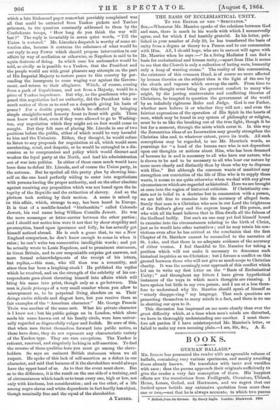THE BASIS OF ECCLESIASTICAL UNITY. To THE EDITOR OF THE
"SPECTATOR."
Sin,—Whenever Mr. Maurice speaks of the relations between God and man, there is much in his words with which I unreservedly agree, and for which I feel heartily grateful. In his letter, pub- lished in your number of July 30, he has transferred the basis of unity from a dogma or theory to a Person and to our communion with Him. All, I should hope, who are in earnest will agree with Mr. Maurice when he says :—" In a living Mediator I can find a basis for ecclesiastical and human unity,—apart from Him it seems to me that the Church is only a collection of hating sects, humanity only a heap of warring atoms." The reality of this communion, the existence of this common Head, is of course no more affected by human theories on the subject than is the light of the sun by the clouds and vapours which enwrap the earth. From time to time this thought must bring the greatest comfort to many who might, by the jarring controversies and conflicting theories of Christians, be tempted to question the government of the world by an infinitely righteous Ruler and Judge. God is our Father, whether men believe it or whether they will not ; and even the faintest expressions of the operation of His Spirit in the hearts of men, which may be found in any system of philosophy or religion, must be to us like the breaking out of the true light, though it be but for a moment, through the mists which cover it. In this way the Zoroastrian ideas of an Incarnation may greatly strengthen the Christian idea and, to whatever extent, prove its truth. All such conceptions may be regarded, to use Mr. Maurice's words, as yearnings for "a head of the human race who is not dependent upon our thoughts or notions about Him, who has been dreamed of because he is and is necessary to all who have our nature, who is shown to be and to be necessary to all who bear our nature by none more clearly and distinctly than by those who try to dispense with Him." But although the common wants of mankind may strengthen our conviction of the life of Him who is to supply those wants, it seems to me quite otherwise when we deal with any given circumstances which are regarded as historical. Here we are brought at once into the region of historical criticism. If Christianity con- sists not in belief in a doctrine but in communion with a person, we are left free to examine into the accuracy of alleged facts. Surely that man is a Christian who sees in our Lord the brightness of the Father's glory and the express image of His person, and who with all his heart believes that in Him dwells all the fulness of the Godhead bodily. But such an one may yet feel himself bound to examine into the circumstances relating to the birth of Christ, just as he would into other narratives ; and he may retain his con- victions even after he has arrived at the conclusion that the first Chapter of St. Matthew cannot be reconciled to the narrative of St. Luke, and that there is no adequate evidence of the accuracy of either version. I feel thankful to Mr. Maurice for taking a position which will not make it necessary to denounce such historical inquiries as un-Christian ; but I foresee a conflict on this ground between those who will not give so much scope to Christian charity. It was the seemingly near approach of this conffict which led me to write my first letter on the "Basis of Ecclesiastical Unity;" and throughout my letters I have given hypothetical instances of the ways in which men's thoughts are running. I have spoken but little in my own person, and I am at a loss there- fore to understand why Mr. Maurice should speak of himself as "utterly disapproving" my language. That such questions are presenting themselves to many minds is a fact, and there is no use in shutting our eyes to it.
This discussion has impressed on me more clearly than ever the great difficulty which, at a time when men's minds are disturbed, we have in thoroughly understanding one another. I must there- fore ask pardon if I have misinterpreted Mr. Mamice's letter, or failed to make my own meaning plain.—! am, Sir, &c., A. Z.






























 Previous page
Previous page